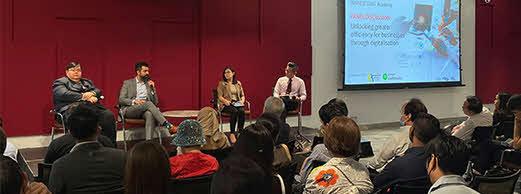Unlocking greater business efficiency through digitalisation
Industry experts shared their insights on how SMEs can begin digitalising their operations in an easy and cost-effective manner.

Digital transformation is more than just a buzzword, but rather a necessity for businesses to succeed in an increasingly connected world. Yet the path to digitalisation isn't a one-size-fits-all solution. So how can SMEs with limited resources take steps to digitalise effectively without incurring overwhelming costs?
At a DBS BusinessClass event titled “Unlocking greater efficiency for businesses through digitalisation,” industry experts shared their tips on how SME owners can start their digital journeys to achieve greater business efficiency.
In partnership with professional services firm Abundant Accounting and QuickBooks, the highlight of the event was a panel discussion with Akash Mohan, Head of Platform Partnerships at DBS, Khoo Boon Wah, Director of Abundant Accounting, and Peggy Chng, founder of local SME Vallous International, where they discussed how SMEs can leverage digital tools to become more efficient.
Start digitalising with small steps
Akash noted that digitalisation does not need to be a mammoth task requiring significant investment. Instead, SMEs can start with small steps that can reap outsized benefits.
"Something as simple as using a spreadsheet like Microsoft Excel is severely underrated," said Akash. "Before taking the leap towards more sophisticated tools, businesses can streamline processes and improve efficiency using such accessible software." His key advice for companies starting to digitalise: Start small, identify processes that consume most time and human resources, and digitalise them incrementally.
Demystifying Fears and Costs
Boon Wah, whose firm Abundant Accounting has assisted over 500 companies in automating their accounting systems, identified fear as a significant hurdle for many SMEs when it comes to adopting new technology.
“Older employees are often intimidated by new technologies, and there's a concern that automation could render them redundant," he said. To address this obstacle, Abundant Accounting offers training programs and step-by-step guidance, backed by subsidies from EnterpriseSG and IMDA (Infocomm Media Development Authority) to alleviate cost concerns.
Peggy Chng, founder of Vallous International, a specialist in energy-efficient digital monitoring solutions, said that her company has implemented various digital tools including accounting solution QuickBooks and a customer management solution tool.
"Automation, efficiency, and error-proofing are my main criteria for selecting digital solutions," explained Chng. "Previously, it took half a day to generate staff payslips manually; now it takes less than an hour," she revealed, as such digital solutions have not only helped Vallous automate repetitive tasks, but also provided real-time financial insights.
Another important concern for many companies is the cost of implementing digital technology. Abundance Accounting offers “low-cost migration packages” for SMEs who wish to adopt such solutions, which comes with more cost-effective subscription models. Rather than incurring large upfront costs, companies can subscribe to software, enabling them to scale usage according to their business needs.
The panellists explained that the fear and cost of digitalisation, often considered barriers, can be mitigated through careful planning, employee training, and making use of available subsidies and assistance from third-party experts.

Combining Technology with a Human Touch
Akash shared about DBS’ approach to combining technologies with the human element to better serve the bank’s SME clients. “That intuition and invisible gut feeling that humans have can't be replaced,” he explained. At DBS, the bank employs AI and machine learning for tasks such as underwriting, and still maintains a team of bankers on the ground for customer engagement.
He cited examples of DBS's partnership with JD Logistics in Hong Kong and QuickBooks in Singapore to highlight how the bank is integrating emerging technologies into platforms that are used by SMEs. These partnerships help to SMEs streamline their operations and financial management. For instance, the new DBS-QuickBooks partnership aims to save time and labour by automatically synchronising bank statements with accounting ledgers.
For SMEs who have only just begun on their digitalisation journeys, Akash urged them to take advantage of the DBS Start Digital Programme, a suite of digital solutions covering key business areas, from accounting and HR to digital marketing and cybersecurity. Businesses can opt for any two digital solutions and enjoy at least 6 months free subscription.
Skill Development and Sustainability
Beyond digital solutions, DBS also provides support schemes to help SMEs in the areas of skills development and sustainability. The DBS SME Skills Booster Program, in partnership with SkillsFuture, aims to help SMEs improve efficiency and productivity by creating a learning and development plan that is aligned with their business goals.
On the sustainability front, DBS guides SMEs in their green transitions by offering tools to gauge where they stand in relation to competitors and industry standards. DBS also offers transition capex financing to help SMEs on their sustainability journey. Akash noted that it was only a matter of time before businesses in Singapore have to comply with increasingly stringent sustainability regulations.
In today's digital landscape, SMEs cannot afford to neglect the importance of digital transformation. However, with the availability of resources like subsidised training programs and tech solutions, as well as the support of partners like DBS, SMEs can now navigate digitalisation more effectively and affordably.
Stay updated with latest industry trends and insights and gain access to exclusive event invitations by subscribing to DBS BusinessClass here.
